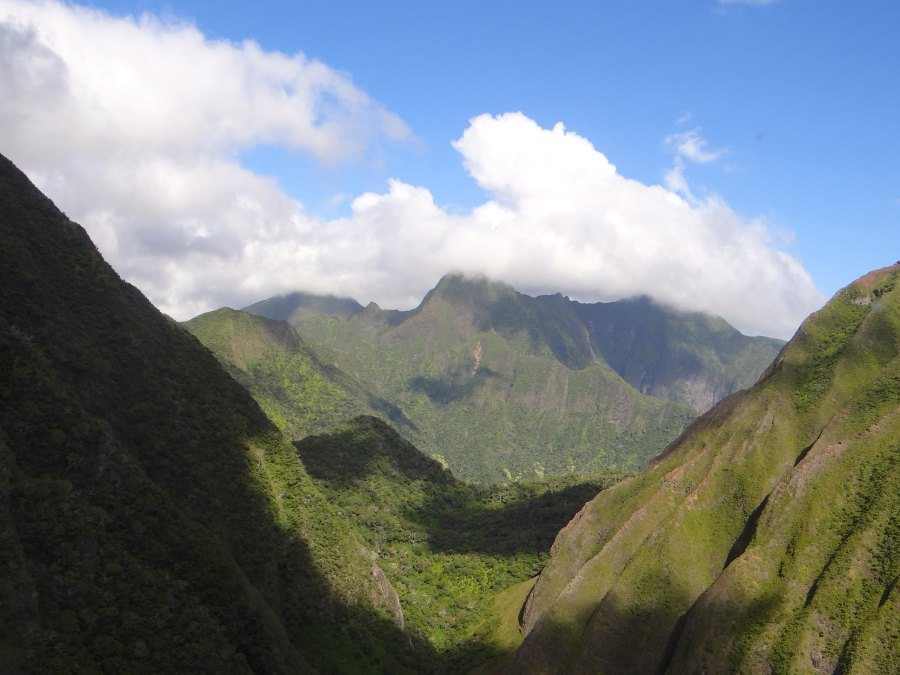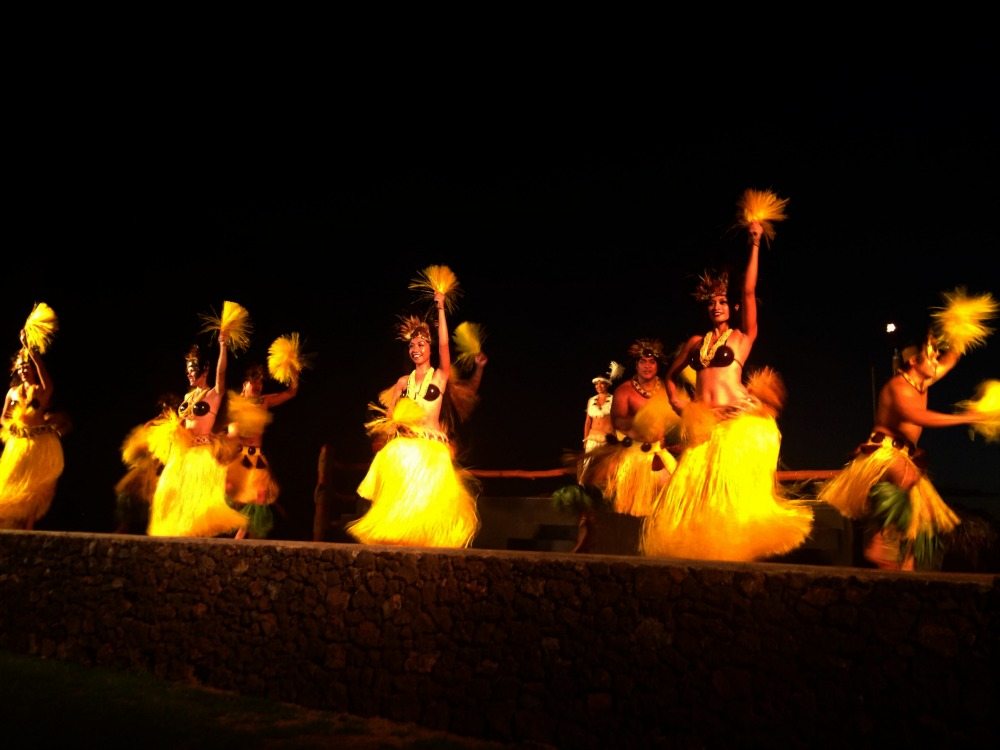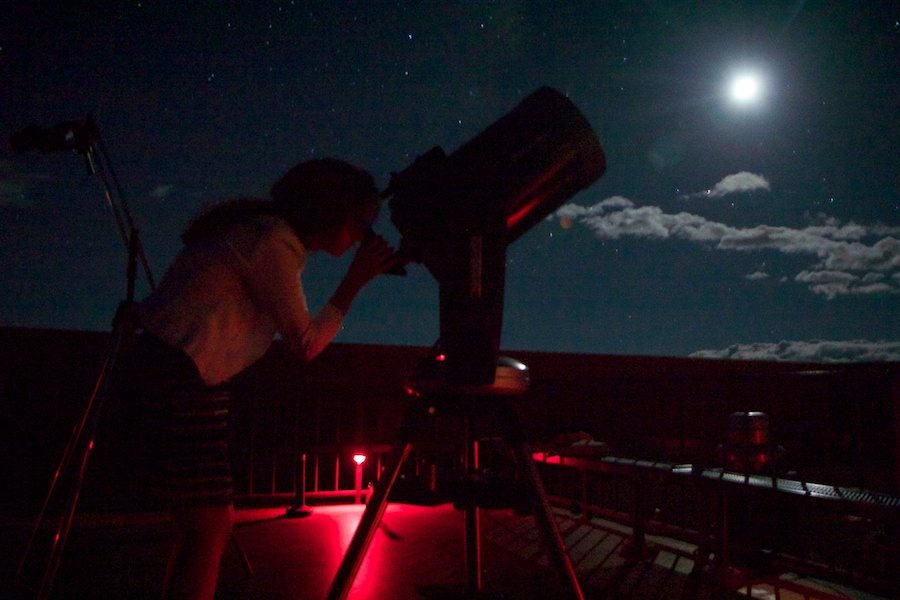Long before arriving to Maui I wanted to do a post about how the island’s culture is reflected through color. Granted, I knew little about Maui but all signs pointed toward blue beaches, green valleys and flower leis in all shades of the rainbow. All this turned out to be true, but I also learned a lot more about Maui’s unique history and fascinating traditions.
Green = Valleys, Palm Trees & Nature Hikes
A lot of the activities I participated on during my trip were water-based but there are actually a ton of nature hikes that are bursting with color. During my helicopter ride, our pilot gave us a tour of Maui’s many valleys and waterfalls and even pointed out a few rare plant species that live on the island.
I didn’t have time to go on a nature hike while in Maui but there are so many great options. I did, however, spend several hours biking through Haleakala National Park. Along the way, there is a beautiful little lavender farm and a patch of fresh-smelling Eucalyptus Trees. A few days later I went paragliding near Rice Memorial Park and Kula Botanical Gardens. At 3,000 feet in the air, you see a while lot of green!

Blue = Water, Sky & Surf
From surfing and paddle boarding to going underwater in a submarine, ocean life is a huge part of Maui culture. While there is always room for improvement, I was pleased to learn that there are many initiatives for protecting the ocean. Even my surf instructors gave us a lesson on how to protect the reef while surfing. There was one point where I sort of crashed into some rocks because I didn’t hop off my board soon enough and instead of worrying about my new “reef tattoo” my main concern was getting back on the beach without doing too much damage to the reef.

Yellow = Luau Fashion & Food
In Hawaiian tradition, a luau (lū’au) is a gathering to celebrate life that always involved food, music, dance, and arts. Nowadays, the type of performance many travelers attend involve food, dance, music and various cultural activities.
However, there are a few differences that separate the two. Firstly, the traditional lū’au was not scripted as it’s often done today and secondly, it did not involve other Polynesian dance (the fire knife dancers are from Samoa, Tahitian dancers with the fast drums and high hair pieces are from Tahiti, poi ball dancing and marking of the face with moku are from their New Zealand cousins).
A luau is still very much apart of local Hawaiian culture. It’s a time when hundreds of families and friends come together to celebrate a special occasion – like a child’s first birthday, a graduation party or a marriage.

Brown = Knowledge Written In The Sand
My first crash course into the Hawaiian language was written in the sand during my surf class. Aloha means hi, by and love but the real meaning goes way beyond greetings. To ‘alo’ is to be in the presence of someone and ‘ha’ refers to breath or in a more complex outlook, your life force. Mahalo means thank but it also is used as you’re welcome since there is no real translation for that phrase in the Hawaiian language. Ohana is the word for family and Nalu means wave so He’e nalu is how you’d say surf.
Going back to the concept of aloha as a greeting, The Fairmont Kea Lani’s cultural coach Jonelle Kamai gave me even more background into this tradition. Historically, Hawaiian would ‘honi ihu’, which refers to a nose-to-nose greeting of breathing in each others breath. Not surprisingly, this is the most intimate type of greeting in any other culture and a way to show that you are accepting that person without judgment. You’ll still see many Hawaiians doing this with people they know well but most people just hug each other or give a quick cheek-to-cheek kiss to say hello.

White
When I found out that I could participate rooftop a tour of the stars, I almost fell over in excitement. Our teacher showed us different stars, planets, galaxies and nebulae through two larger-than-life telescopes. I had never seen the moon so clearly before, nor had I been able to decipher red stars from blue.
Maui has an interesting history with stars. Voyaging Polynesians used the stars as their only source of navigation to reach the Hawaiian Islands more than 1,000 years ago. It’s pretty fantastic really, especially when I think of how dependent I am on Google Maps. (photo by Sherry of OttsWorld)

This trip was hosted by Maui Visitors & Convention Bureau. All opinions are my own.

Megan Eileen McDonough is writer, blogger and social media specialist based in New York City. She also runs Bohemian Trails, a lifestyle blog designed for the savvy and stylish traveler. Bohemian Trails aims to feature must-see places around the world, covering everything from revamped neighborhoods and vibrant street art to innovative tech hubs and everything in between. Her cultural escapades have taken her to Latin America, Asia, Europe, and the Middle East.
Megan is also a freelance writer and social media specialist based in New York City. She contributes to various online and print publications in the travel and fashion industries and is an international correspondent for both Jetsetter and Northstar Travel Media.








